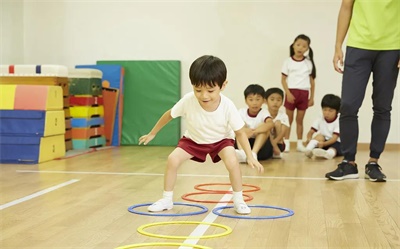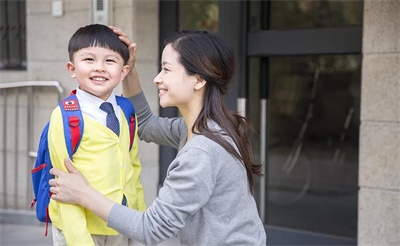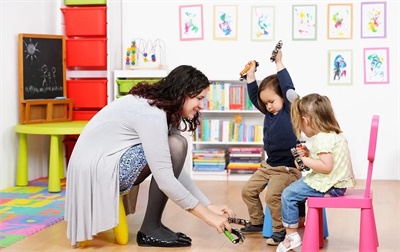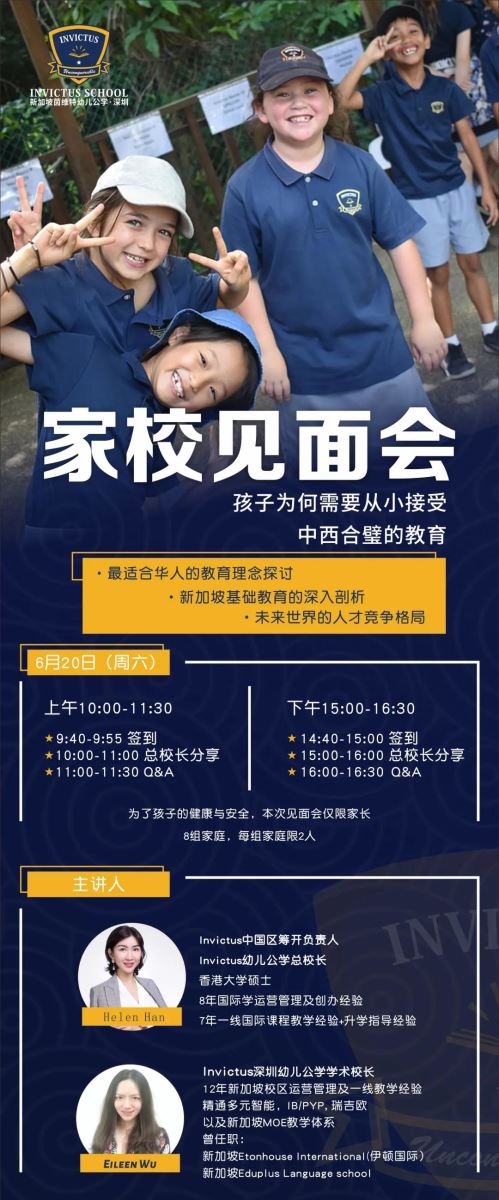随着全国疫情趋好,“小神兽们”陆续回归学校,上周您是否也体验了他们入学前“哭哭啼啼”、“大哭大闹”甚至“不吃不喝”的招式?
其实,入学焦虑对孩子来说是必经之路,如同走路遇到一个小水洼,跳过去就可以继续前进。
猜猜看,孩子最早的分离焦虑出现在什么阶段?
As the epidemic slowing down in China, kids are returning to school. Last week, you might experience their crying, shouting, or even refusing to eat anything.
In fact, separation anxiety is common for every child. Guess what, what stage did the separation anxiety occur the earliest?

分离焦虑开始于8-12个月
Separation anxiety begins at 8-12 months
《美国儿科学会育儿百科》中指出,接触生人时会紧张是孩子情感发育的个里程碑。这是TA次区分出熟悉和不熟悉这两种情况的不同,这一阶段出现焦虑也是TA与您之间关系健康的证据。这种情况通常在10个月至1岁时达到顶峰,接着在1岁半至2岁逐渐消失。
入学焦虑只是孩子突然从熟悉环境到陌生环境的一个正常表现,孩子需要一个适应的过程。
According to 《Caring for Your Baby and Young Child》, getting nervous when contact with stranger is the first milestone in a child's emotional development. This is the first time that a kid has noticed the differences between familiar and unfamiliar environment, which is also an evidence of his/her strong connection with you. This usually peaks at 10 months to 1 year old, and then ease up between the ages of 1.5 years old and 2 years.
Separation anxiety is normal for a child facing a strange environment, and he/she needs time to blend in.

入学焦虑的类型
Types of Separation Anxiety
每个孩子都是独一无二的,但孩子的焦虑表现大体分为四种类型,了解孩子的焦虑类型才能够“对症下药”,帮助孩子顺利渡过入学焦虑期。
Each child is unique, but the behavior of anxiety can be roughly categorized into four types. To understand child’s anxious behavior would better help him/her go through the anxious period.
01表演型
这类孩子非常聪明,擅于对大人察言观色,是否哭闹取决于谁送Ta上学。
给家长的建议:
与孩子果断告别,积极快乐的说再见。
Acting
These children are smart, and good at observing adults. Whether to cry or not depends on who sends them to school.
Advice for parents:
Saying goodbye to your child in a decisive way, and leaving positively.
02极度敏感型
入学天一直要求父母抱,不跟其他孩子互动,不跟老师接触。
给家长的建议:
切忌不告而别,与孩子建立拥抱、亲吻的正式告别仪式。
Sensitive
This type of children usually ask parents to hold them, and not interact with other children or teachers.
Advice for Parents:
Don't leave without saying goodbye, and set up a formal farewell ceremony with your children with hugging and kissing.
03大哭大闹型
情绪失控,大哭大闹,坚决不上学。
给家长的建议:
父母们切忌情绪失控或言语威胁。请接纳孩子的情绪,给孩子准备喜欢的玩具作为安慰物,并在日常生活中保持短暂离别。
Crying and Shouting
This type of children are emotional, crying and shouting, and refuse not to go to school.
Advice for Parents:
Parents themselves should control their own emotions, and not use any verbal threats. Accepting your children’s emotions, and preparing your child's favorite toys as comforting objects. Trying to keep short separation with your children in your daily life.
04谨慎观察型
不参与学校活动,只是观察,但回家后会与父母分享学校的动态。
给家长的建议:
早做铺垫,提前到校园观摩了解,并告诉孩子接送的时间地点。
Observing
This type of children do not participate in school activities, but observe. However, when they go home, they share with their parents what is happening at school.
Advice for Parents:
Take your children to visit school beforehand to observe and learn, and let them know when and where to pick them up.

不论哪种焦虑类型,Invictus幼儿公学学术校长Eileen给出了通用的建议:
Regardless of the type of anxiety, Eileen Wu, Academic Principal of Invictus Pre-school, offers some general advice:
01
家长在日常生活当中培养孩子独立的意识,如自己穿鞋子,自己整理自己的物品,自己收玩具并及时给予鼓励和肯定,让孩子体验自己做事情的成就感。
During the daily life, parents need to help their children to become independent, for example, wearing their own shoes, tidying-up their own toys. Give encouragement and affirmation afterwards to let children feel proud of themselves.
02
在孩子闹情绪、发脾气的时候,家长不要先否定孩子,如:“你怎么不听话?”先聆听和接纳孩子的情绪,如“我知道你现在很难过。” 再根据具体的事情帮助孩子梳理她的情绪,找出原因和解决的方法。
When children are being emotional or losing their temper, parents should not deny their emotions but listen and accept their emotions first. Telling them such as " I understand you're upset right now.” Then comfort them, and find out the reason and help them to solve the problem.
03
家长不要轻易许诺,一旦承诺就一定要兑现。尽量不要给出:我会早点来接你/我个来接你的承诺,可以换成“你吃完下午茶点我来接你“或者“你唱完离校歌,我就来接你”。
Parents should not make promises that they cannot keep. Try not to tell your children: “I will come to pick you up early” or “I will be the first to pick you up”. Instead, you can say: "when you finish the afternoon tea I will pick you up" or "when you finish the school song, I will pick you up."
04
在日常生活当中尽量问孩子开放性的问题,来帮助孩子过渡分离焦虑的时期。比如用“你今天最喜欢玩的游戏/玩具/活动是什么?” 来取缔“你今天开心吗?”孩子在未适应学校生活的时候,一般会以否定式来回答问题。开放式问题更利于孩子反思和回忆一天当中让自己开心、兴奋的事情来取代离开父母的短暂失落。
Try to ask your children open-ended questions. For example, " What are your favorite games/toys/activities today?", rather than “Are you happy today?” When the children haven’t get used to school, they usually give negative answers. Open-ended questions will help children reflect and recall what makes them happy and excited during the day to distract them from the emotions of leaving their parents.

针对入学焦虑,校方可以做什么?
What can schools do to help children get through separation anxiety?
Invictus幼儿公学学术校长Eileen说:
Eileen Wu, Academic Principal of Invictus Pre-school, says:
老师在学生入学前将掌握孩子的基本信息、性格特点、喜好和擅长的活动,如:艺术、音乐、搭建等。在孩子入学当天,老师根据孩子的喜好引导孩子加入校园活动。
入学前我们需要家长的配合,完成孩子详细情况的问卷调查,内容包括:孩子的饮食睡眠习惯、自理能力、体能、语言表达能力、动手能力等。
我们会根据入学过渡阶段孩子出现的情况,必要时提出配合的要求或给予家长专业的建议。对于插班生,在正式入学前家长可以带着孩子参观访校,熟悉学习环境。
Before students enter the school, teachers will gather information of the students, including their basic information, personalities, preferences and activities they are interested in. On the first day of school, teachers will guide the students to participate in the activities according to the child's preferences.
Before entering school, parents will need to complete questionnaires which helps school to better understand the students. The questionnaire includes children's diet, sleep habits, self-care ability, physical ability, language expression ability and hands-on ability etc.
During the beginning period of school, teachers will keep track of students daily life at school and give professional advice to parents if necessary. For transferred students, parents can take their children to visit the school in advance to get familiar with the learning environment.

希望每一个已经入校和即将入校的“小神兽们”能够平稳渡过焦虑期,快快乐乐渡过校园生活的每一天。
Hope every child could easily get through separation anxiety, and enjoy his/her school life everyday!
